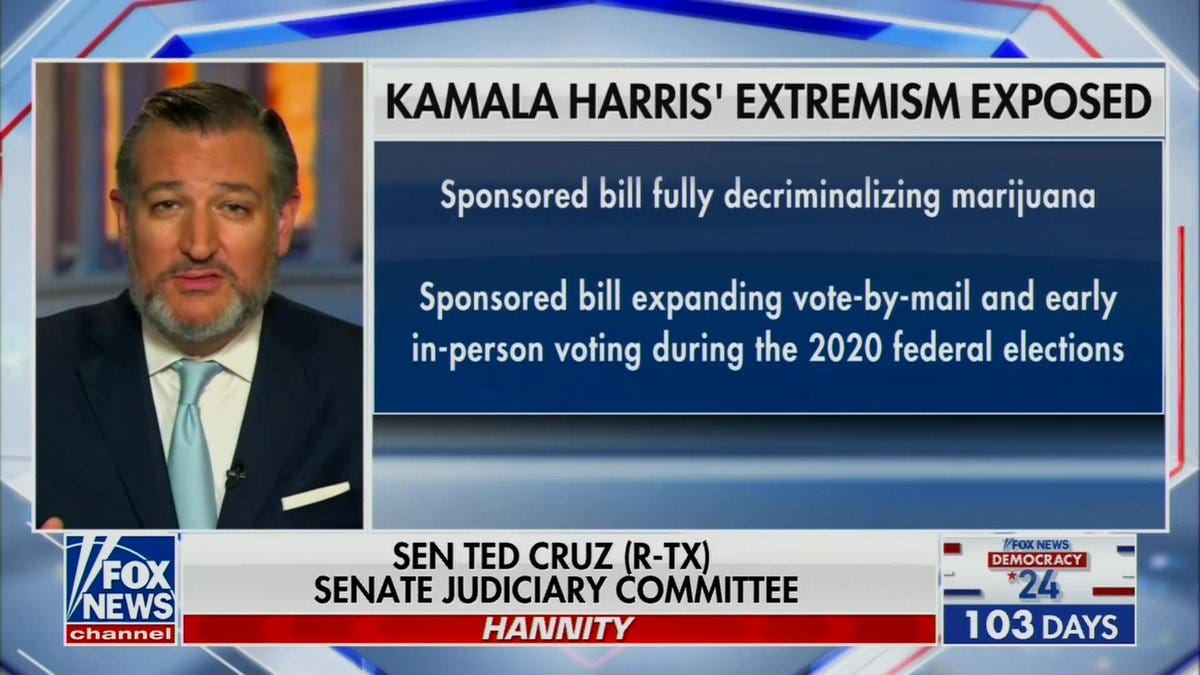The GOP's legal challenges to Harris's candidacy are bunk
They're also amazingly hypocritical.
This free edition of Public Notice is made possible by paid subscribers. If you aren’t one already, please sign up and do your part to make independent journalism sustainable.
While Democrats wasted no time this week rallying around Kamala Harris, Republicans were just as quick to start trying to sabotage her campaign with lawfare.
It isn’t surprising that the GOP is taking this approach. Trump is already flailing politically, claiming that Republicans should be reimbursed for “fraud” since they spent money campaigning against Biden. Meanwhile, the National Republican Senatorial Committee’s big opposition research drop consists of damning tidbits like “Kamala Harris pledged to ban plastic straws” and “Kamala Harris loves Venn diagrams.”
A Reuters poll shows Harris already up two points over Trump, and since his campaign doesn’t yet have much of a strategy to beat Harris at the ballot box, they’ve got to try to hamper her elsewhere.
Enter Speaker of the House Mike Johnson. Johnson didn’t even wait until Biden announced he was stepping aside to start making claims that switching candidates at the top of the ticket is illegal.
Last Sunday, Johnson went on ABC’s “This Week” to float his argument that some states could not put a different Democratic candidate on the ballot for November. He said basically the same thing to CNN’s Jake Tapper, contending that “in some of these states, it’s a real hurdle” to replace Biden on the ballot. After Biden announced a few hours later that he would stand down and endorsed Harris, Johnson complained that such a move “invalidated the votes of more than 14 million Americans who selected Joe Biden to be the Democrat nominee for president.”
This is especially rich coming from Johnson, an election denier who took an active role in trying to invalidate the votes of 81 million Americans who voted for Biden in 2020. Johnson is no stranger to floating spurious legal theories to undermine electoral outcomes he doesn’t like. He helped organize getting 125 House Republicans to sign on to a Texas lawsuit seeking to reverse Biden’s victories in Georgia, Michigan, Pennsylvania, and Wisconsin. Back then, Johnson’s theory was that if state election officials altered voting procedures during the covid pandemic without the state legislature's approval, those results should be overturned.
Johnson hasn’t really fleshed out any legal theory as to why no candidate other than Biden can appear on the ballot in any particular state. However, other Trump allies have already taken up the torch. The Heritage Foundation, not content just to be the architect of Project 2025, had already been floating their “election integrity concerns” if Biden were to be replaced on the ballot. They’re prepared to target three swing states — Georgia, Nevada, and Wisconsin — for pre-election litigation.
If one steps back for even a moment, it’s clear how absurd this potential challenge is, which is why election law expert Richard L. Hasen has already debunked it: there’s no one on the ballot yet, so any argument about replacing someone on the ballot is moot.
Harris will be on the ballot
Biden’s victories in the primaries made him the presumptive nominee, but the official nominee is chosen at the Democratic National Convention. States have varying rules as to ballot deadlines, but importantly, none of those deadlines have yet passed.
Yes, this is the case for Georgia, Nevada, and Wisconsin too. A Georgia state elections official posted on X that since Democrats have not yet had a convention, there is no nominee to replace. Wisconsin’s ballot deadline is September 3, as is Nevada’s. Nor has the ballot deadline passed in Alabama, Indiana, Michigan, Minnesota, New Mexico, Ohio, Pennsylvania, Texas, and Washington — despite Grok, Elon Musk’s “non-woke” AI chatbot, saying so.
A note from Aaron: Working with brilliant contributors like Lisa takes resources. To support our independent journalism, please click below and become a paid subscriber if you aren’t one already.
On Tuesday, Trump took another approach to try to hamper Harris’s candidacy. The campaign filed a complaint with the Federal Elections Commission saying that the Biden campaign could not rollover $91.5 million in funds to Harris.
Of course, since it’s the Trump campaign, the complaint is filled with hyperbole rather than making an actual legal argument: “Kamala Harris is seeking to perpetrate a $91.5 million dollar heist of Joe Biden’s leftover campaign cash — a brazen money grab that would constitute the single largest excessive contribution and biggest violation in the history of the Federal Election Campaign Act.” The complaint asks the FEC to block the transfer of funds and, if the transfer was unlawful, to issue a fine or make a criminal referral to the Department of Justice.
This complaint was to be expected, given that Sean Cooksey, the current chair of the FEC and a Trump appointee, had telegraphed a challenge of this sort on Monday in an interview with NPR’s Morning Edition. Cooksey told NPR, “I think it’s gonna have to go through a process, through the FEC,” and said he expected challenges “probably in the courts as well.” He’s also busy posting his theories about it on X. Cooksey is a full-fledged Republican operative, having worked for both Josh Hawley and Ted Cruz.
Hasen told CNN that he didn’t think most campaign finance lawyers thought this was the best reading of the law. Even Vivek Ramaswamy’s former general counsel, Steve Roberts, told The Hill that Cooksey’s interpretation of the law was “likely wishful thinking” because the “reasonable interpretation is that the Biden campaign committee is a shared one between Harris/Biden.”
Even if the complaint had merit, the FEC is ill-suited to provide swift relief to the desperate Trump campaign. The commission has an even number of commissioners — six — who are nominated by the president. No more than three commissioners can be members of the same party, but at least four commissioners must agree for the FEC to take any meaningful action. Because of this, the commission deadlocks frequently on complaints.
When the three Republican appointees vote in lockstep, they have been able to thwart investigations into Trump’s campaign finance violations. This means the FEC took no action against him for routing payments through his former campaign manager, Brad Parscale, and refused to open an investigation into his hush money payments to Stormy Daniels.
In this instance, one of the Democratic appointees would have to agree with the Republican commissioners for any action to be taken on the complaint about Harris receiving campaign funds. Even were that improbable event to occur, the FEC’s process moves slowly enough that it is unlikely to address the complaint before Election Day.
The possibility of SCOTUS shenanigans can’t be dismissed
Of course, the Trump campaign can also look to the federal courts.
The campaign didn’t get much traction with its flurry of lawsuits over the 2020 election, losing 61 of 62 suits it filed. With that, it’s tempting to believe that the courts would not entertain spurious claims against the Harris campaign, be those about ballot access or campaign funds.
However, at the end of its last term, the right-wingers on the US Supreme Court pulled off a power grab that drastically shifted authority away from agencies like the FEC and toward the courts. That same majority, of course, also granted Trump broad immunity from criminal prosecution.
Additionally, the specter of Bush v. Gore already hangs over the 2024 election. Twenty-four years ago, the Supreme Court stepped in to stop Florida from recounting votes, thereby handing the presidency to George. W. Bush, despite states having broad latitude for determining their own election processes. It’s difficult to be certain that conservative jurists will follow the rule of law if the chance exists that they could thwart a Democrat from taking office again.
Only one member on the Court in 2000 remains — Justice Clarence Thomas, arguably its most conservative and least ethical member. But three people who worked for the GOP during that 2000 ballot contest now sit on the Supreme Court: Chief Justice John Roberts and Justices Amy Coney Barrett and Brett Kavanaugh. Add to that the insurrection-curious Justice Samuel Alito and the hard-right stylings of Justice Neil Gorsuch, and it’s depressingly easy to see why the Trump team might think the Court will ultimately save him if things are close.
Which is why it’s so important that things not be close, financially or electorally. If the FEC or the courts somehow manage to thwart Harris from receiving the $91 million initially raised by Biden, the Harris campaign will need to make that up elsewhere. Fortunately, Harris’s initial haul saw hundreds of thousands of donors making their first donation of the 2024 election cycle, which hopefully shows an increased enthusiasm on the part of small donors to carry Harris across the finish line.
Similarly, if the election doesn’t come down to a few votes in a few states, but instead is a solid victory across the board, the Supreme Court won’t have a path to flip it to Trump (as was the case in 2020). That makes for a lot of work between now and November, but the chances of thwarting the orange menace from returning to the White House seem much brighter than they did just a week ago.
That’s it for today
We’ll be back with more tomorrow. If you appreciate this post, please support Public Notice by signing up. Paid subscribers make this newsletter possible.
Thanks for reading.








Personally I think the Orange Turd is just pissy in his diapers that the money he has raised is being used to pay off the legal fees that he's got.
He brought that on himself, but as we all know, he never owns up to his fuckups.
As has been amply shown over the years, Donald J. Trump is a bully … who lets others do his dirty work.
There have been over 60 lawsuits filed on his behalf contesting the “stolen” 2020 election.
Yet NONE have been Trump v. Biden. Why? Perjury on the courthouse steps seems to be perfectly acceptable, even expected, these days … perjury in court, definitely not. In fact, it’s a crime.